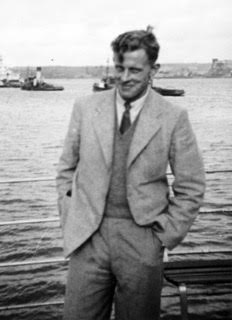Nigel Tucker (1930-2021)
Nigel Tucker, with some of the coins from his collection
I
was saddened to hear recently of the death of Nigel Tucker, founding member of
the Woodbury History Society, who helped to make the 2018 exhibition at Budleigh’s
Fairlynch Museum such a success.
Putting together a museum exhibition can be incredibly time-consuming, especially if you decide to borrow items from places which insist on the payment of high insurance premiums and the completion of detailed questionnaires to satisfy the bureaucrats and pay the lawyers.
So when the Raleigh 400 exhibition at Fairlynch
Museum was staged to honour Sir Walter in the 400th anniversary year
of his death, the generosity of kind friends and neighbours in providing items for
display was much appreciated.
Coins of the period were especially interesting. Not only had they been lent thanks to a kind friend of the Museum but they were genuinely local. Maybe Sir Walter himself may have dropped the odd groat or shilling running across Woodbury Common to school, wherever that was. That time in his life is a bit of a mystery, but the coins most definitely were not, thanks to the enthusiasm and interest of Nigel Tucker. All the coins in the Raleigh 400 display were described in detail, including an indication of the field in the Woodbury area in which they were found.
Woodbury was incredibly fortunate in counting Nigel as one of its residents. He was born on the Knightshayes estate near Tiverton, on 10 August 1930. His childhood was spent, as an article in Woodbury Village News revealed, in ‘roaming the land looking at everything - beetles, birds, fish; being inquisitive; and frequently falling into the Exe’.
After a successful career in physical education, ending as Head of PE at St Luke’s, the University’s School of Education in Exeter, he took early retirement to settle in Woodbury: painting, model aircraft making, ballroom dancing, teaching guitar and serious metal detecting were just some of the activities that he threw himself into. His impressive collection of finds is now in the care of Woodbury History Society, of which he was the first Chairman.
The display of all Nigel’s coin finds in the
Raleigh 400 exhibition was accompanied by the following information:
‘Copper coins are among the commonest of detector finds. Most of these are Georgian halfpennies, but unfortunately in our local soils they are almost invariably heavily corroded with no distinguishing features. Most prized are the hammered silver coins mainly from the medieval and Tudor periods, and these usually turn up in a slightly blackened state but with the surface intact.
'Hammered silver coins were produced until 1662 by striking the silver disc or ‘flan’ between iron dies, the bottom one of which was hand-held and then hammered. This often resulted in off-set images and double strikes. Many coins were later clipped to yield illegal silver for the temporary owner, or shaken with others in a bag to produce silver dust – a process known as ‘sweating’. Hammered coins are always welcome finds as they are delightful in their rather primitive crudeness, but unfortunately they are rather uncommon.’
For his deep knowledge of such East Devon matters I am reminded of people from the past like the eminent Raleigh scholar Dr T.N. Brushfield, who lived on Cliff Road in Budleigh, at The Cliff, where he is honoured with a blue plaque. And then there’s the amateur archaeologist and keen numismatist George Carter, whose collection of antiquities formed part of Fairlynch Museum’s collection when it opened in 1967.
Nigel’s generosity and enthusiasm will be long remembered by his many friends in East Devon and further afield. Thanks to the internet you can see the range of Nigel’s ‘finds’ on the Woodbury History Society website. The section ‘Woodbury History beneath your feet’ is especially inspiring for anyone with pride in their local community and an interest in its history. Click here to access the site.






Comments
Post a Comment